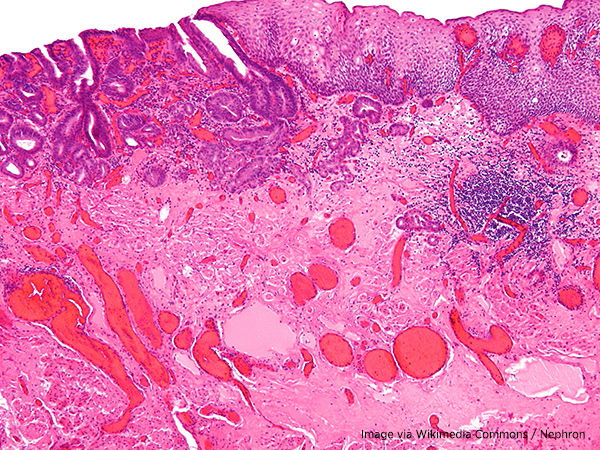Zeroing In on Two Rare Cancers Affecting the Digestive System
The FDA approved a molecularly targeted therapeutic for treating certain patients with some rare cancers affecting the gastrointestinal system.

The U.S. Food and Drug Administration (FDA) has approved the molecularly targeted therapeutic fam-trastuzumab deruxtecan-nxki (Enhertu) to treat adult patients with locally advanced or metastatic gastric or gastroesophageal junction adenocarcinoma whose tumors are HER2-positive and who have received at least one prior trastuzumab-based regimen.
Fam-trastuzumab deruxtecan-nxki belongs to a family of therapeutics called antibody-drug conjugates. In this case, the antibody is designed to seek out cancer cells that overexpress HER2—a protein that is overexpressed in some cancer cells and can help fuel cancer growth. Attached to the antibody is a toxic payload, which is released into the cancer cell to cause DNA damage and cell death.
Gastric or stomach cancer is a disease in which cancer cells form in the lining of the stomach called the mucosal layer and spread through the outer layers of the stomach. Gastroesophageal junction adenocarcinoma is a rare type of esophageal cancer that starts in the mucosal layer of the gastroesophageal junction—the area where the esophagus joins the stomach—and is often diagnosed in the lower third of the esophagus.
The efficacy of fam-trastuzumab deruxtecan-nxki in treating these two cancers was evaluated in a multicenter, open-label, randomized trial involving 188 patients whose disease had progressed on at least two prior regimens that included trastuzumab-based therapies. Patients were randomized to either receive fam-trastuzumab deruxtecan-nxki or treatment with one of two chemotherapy agents.
The overall survival was 12.5 months for the patients in the group that received fam-trastuzumab deruxtecan-nxki, compared with 8.4 months for the patients who received chemotherapy. The objective response rate was 40.5 percent for those in the fam-trastuzumab deruxtecan-nxki arm of the study compared with 11.3 percent for patients in the chemotherapy group.
The FDA approval came with a boxed warning to advise health professionals of the risks of interstitial lung disease and embryo-fetal toxicity.
The FDA rendered its decision on January 15, 2021.